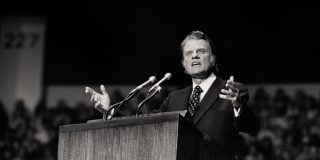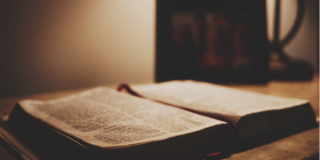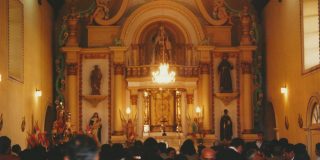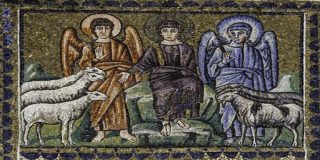A few years back the BBC ran a program where they asked leading international figures to identify the defining moment of their lives. One of the interviewees was Desmond Tutu. He took us back to a day when he was just nine years old, to when he was a young black boy living under South Africa’s apatheid regime. Desmond and his mother were walking down the street when a tall white man dressed in a black suit came towards them. In the days of apartheid, when a black person and a white person met while walking on a footpath, the black person was expected to step into the gutter to allow the white person to pass and to nod their head as a gesture of respect. It was a custom designed to keep black people in their place and it was deeply humiliating. But this day, before a young Tutu and his mother could step off the sidewalk the white man stepped off the sidewalk and, as Desmond and mother passed, the white man tipped his hat in a gesture of respect to Desmond’s mother!
The white man was Trevor Huddleston, an Anglican priest who was bitterly opposed to apartheid. The moment Trevor Huddleston stepped off the sidewalk he changed Desmond Tutu’s life. When his mother told him that Trevor Huddleston had stepped off the sidewalk because he was a man of God Tutu found his calling. “When she told me that he was an Anglican priest I decided there and then that I wanted to be an Anglican priest too. And what is more, I wanted to be a man of God” said Tutu.
I suspect that until this morning you had never heard of Trevor Huddleston. But without Trevor Huddleston there may never have been an Archbishop Desmond Tutu and the course of South Africa’s history may have been very different.
We are looking at limiting beliefs, those lies and half truths we tell ourselves that stop us from becoming everything God created us to be. The limiting belief I want to expose this morning runs like this: What I do doesn’t matter. I am insignificant. My actions don’t change anyone or anything.
Do you ever find yourself living by that creed? I think that this has been one of the great areas of growth for me over the years. I have had people share with me how this sermon has helped shape their life or that encouragement I offered has helped motivate them, or our engagement over many years has influenced them. But for a long time I found it hard to really take them seriously. I wanted to discount any influence I might have had. And that did no-one any service. It meant I could very easily let people down, not be there at the exact time they might have been looking for my support.
Oh, I knew in my head that I was having an impact but it’s only recently that I’ve really owned the fact that what I do and say makes a difference, that I’ve accepted the truth that I am influential in the lives of a number of people. And I want to suggest that exactly the same is true of you.
You are created to do good works
I wonder if you’ll come with me to Ephesians chapter 2. In the first ten verses of this chapter the writer spells out how God has brought us to himself. And he finishes the section with this: “For we are God’s workmanship, created in Christ Jesus to do good works, which God prepared in advance for us to do.”
That’s an incredible statement is it not? We are created in Christ Jesus to do good works. God’s purpose for you is that you do good works, that you be a force for good in the world.
Just stop and turn that over in your mind. “God created me to do good works, to be a force for good in the world.” Imagine how this one simple truth can ooze out of you and into your world. The next time you see someone struggling, imagine what might happen if you say, “I am created to be a force for good in that person’s life”.
The next time your children are asking for your time, but you want to do something else, imagine what might happen if you say, “I am created to be a force for good in my child’s life”.
The next time an opportunity to serve in the church or community presents itself, imagine what might happen if you say, “I am created to be a force for good in this community”.
There are no saints, only flawed people doing the best they can
You might be aware of your flaws and looking at them say, “how can I consider myself an influence for good?”
One of my favourite novels is a book called Eminence, written by Australian author Morris West. It tells the story of Luca Rossini, a Cardinal in the Roman Catholic Church. Luca who now serves in the Vatican, lives in the shadow of a terrible experience he suffered as a young priest in Argentina. It was the 1970′s, a time when the military junta that ruled Argentina, acted with terrible brutality, Luca was serving as priest in an Argentinian village. One day the military brutalises him in front of the villagers. Lucky to escape with his life he is spirited out of Argentina. Yet the scars across his back are an outward symbol of the scars he bears within. By the time we find him in West’s novel Luca is 50 years old, a confidant of a rigidly conservative Pope. He has had to deal not only with his suffering, but his sense of betrayal at the silence of many Church leaders during the “dirty war” in Argentina.
At one point in the novel Luca is interviewed by Steffi Guillerman, a journalist. They sit opposite each other, and Guillerman launches straight into it. “Let’s deal with the big questions first. What’s wrong with the Church?”
Luca replies, “The same things that have been wrong with it for two thousand years – people! Men and women and children, too, who make up the family of believers. This isn’t a community of the pure and the perfect. They’re good, bad and indifferent. They’re ambitious, greedy, fearful, lustful, a rabble of pilgrims held together by faith and hope – and the difficult experience of love.”
I think that’s about the best description of the church I’ve ever heard. “This isn’t a community of the pure and the perfect. They’re good, bad and indifferent. They’re ambitious, greedy, fearful, lustful, a rabble of pilgrims held together by faith and hope – and the difficult experience of love.”
I suspect that one thing that holds some of us back is we see only one side of this. We see the bad things we are capable of and we use that to deny the good we are capable of. But you know what, Ephesians was written to a group of people just like you and me. When it says we are God’s workmanship, created for good works, it’s saying that to a community that’s good, bad and indifferent, ambitious, greedy, fearful, lustful, a rabble of pilgrims held together by faith and hope – and the difficult experience of love. It’s reminding us that whatever bad we might do, and no doubt will do, we also have enormous good we can do, and if we open ourselves to God’s call, will do.
There are no heroes, only flawed people all making a contribution to the good
I wonder if you’ve ever heard of Thomas Clarkson? Clarkson was an Englishman. In 1785 he entered an essay contest. The topic was the abolition of slavery. He wasn’t really interested in slavery but he was interested in winning the competition. But as he researched his essay something started to change. The plight of his fellow human beings became far more important than winning the essay competition. For the next sixty years he dedicated himself to the abolitionist movement. He spent sixteen hour days on the cause. He travelled up and down the British Isles speaking about slavery, exposing its evils. Each town he entered he would form an abolitionist circle, a group of people who would work together to end slavery.
You’ve probably never heard of Clarkson, but he was as much a figure in the abolition of slavery as was William Wilberforce. And so were countless others.
Clarkson reminds me not to fall for the myth of the Messianic hero. Whenever good is achieved in this world it is rarely achieved by the heroic actions of one person. It is usually achieved by the heroic actions of a multitude of people. It is rarely achieved in giant leaps. It is usually achieved in a series of small steps. It is rarely achieved by singular big actions. It is usually achieved by a lot of people engaging in a multitude of small actions, such as forming abolitionist groups from one town to the next, or stepping off the sidewalk for a black woman and her nine year old son.
The bible captures this dynamic when it speaks of us as members of a body, each with a contribution to make. Ephesians 2:10 told us we are created to good works. A little later on it make clear this is a community effort.
So Christ himself gave the apostles,the prophets, the evangelists, the pastors and teachers, 12 to equip his people for works of service, so that the body of Christ may be built up 13 until we all reach unity in the faith and in the knowledge of the Son of God and become mature,attaining to the whole measure of the fullness of Christ.
14 Then we will no longer be infants, tossed back and forth by the waves, and blown here and there by every wind of teaching and by the cunning and craftiness of people in their deceitful scheming. 15 Instead, speaking the truth in love, we will in all things grow up into him who is the head, that is, Christ. 16 From him the whole body, joined and held together by every supporting ligament, grows and builds itself up in love, as each part does its work.
The logic is simple. Christ gifts some for leadership and speaking roles. They in turn equip the church for “works of service”. Why? “So that the body of Christ may be built up”, that the body of Christ “grows and builds itself up in love, as each part does its work.” In other words, doing good works is a collective effort taking place as we each make our contribution.
Owning It
I want to close by sharing a poem written by Marianne Williamson. It goes like this.
It is our light not our darkness that most frightens us
Our deepest fear is not that we are inadequate.
Our deepest fear is that we are powerful beyond measure.
It is our light not our darkness that most frightens us.
We ask ourselves, who am I to be brilliant, gorgeous,
talented and fabulous?Actually, who are you not to be?
You are a child of God.
Your playing small does not serve the world.
There’s nothing enlightened about shrinking so that other
people won’t feel insecure around you.
We were born to make manifest the glory of
God that is within us.It’s not just in some of us; it’s in everyone.
And as we let our own light shine,
we unconsciously give other people
permission to do the same.As we are liberated from our own fear,
Our presence automatically liberates others.
I’m not sure that our greatness is our greatest fear, but I think Williamson hits the nail on the head when she says,
We ask ourselves, who am I to be brilliant, gorgeous,
talented and fabulous?Actually, who are you not to be?
You are a child of God.
Your playing small does not serve the world.
You are God’s workmanship, created to do good works. Your actions count. You make a difference in the lives of people around you – in your school, your workplace, your club, your church, your neighbourhood. And by the grace of God that can be an impact that brings blessing and good to others. So close your eyes and ask yourself:
Have I been living the lie that I am insignificant?
Am I willing to replace tat limiting belief with the truth that God created me to be a force for good?
How will I make this truth concrete in my world this week?






